Hot northern summer ’06 .. the dysfunctional nation will rise again
Jun 15th, 2006 | By Counterweights Editors | Category: Key Current Issues If you’re wondering just how bad the true north could be in any hypothetical new Conservative majority age of Stephen Harper, check out Paul Jackson’s column in the June 13 Calgary Sun. It’s called “Nation of sheep: If Harper can’t turn it around there’s little hope for Canada.”
If you’re wondering just how bad the true north could be in any hypothetical new Conservative majority age of Stephen Harper, check out Paul Jackson’s column in the June 13 Calgary Sun. It’s called “Nation of sheep: If Harper can’t turn it around there’s little hope for Canada.”
It seems a good guess that the Calgary Sun is as uninfluential in the real world of politics as the Toronto Sun. Yet as summer 2006 looms it is not easy to say that Paul Jackson’s fretting over whether “Canada is truly a dysfunctional nation” is totally misplaced.
The current random list of strange tales includes: (1) home-grown Islamist terrorism; (2) fiscal imbalance and equalization payments; (3) official apology for Chinese head tax, 1885-1923; (4) new “autonomy” in Quebec; (5) bizarre Liberal leadership race; (6) old aboriginal rights in Ontario; (7) bizarre provincial election in Nova Scotia; and (8) Senate reform in the West.
If you insist on seeing all this optimistically, it may be that the long funk which settled over Canadian federal politics after the failure of the Charlottetown Accord in 1992 (followed by the near success of the wrong side in the 1995 Quebec referendum) has begun to lift at last. For whatever exact reasons, the nation of sheep is starting to bleat again. And though there are no doubt many real problems to worry about, this is probably a good sign.
1. Home-grown Islamist terrorism?
 You have to be a crazed believer in a paranoid style in Canadian as well as American politics to seriously entertain the thought that the recent dramatic arrest of 17 alleged home-grown Canadian Islamist terrorists in the Toronto area was some kind of plot to give Prime Minister Harper’s hopes for a majority government in the next federal election a strategic shot in the arm. But even if it was (which of course it wasn’t), the latest polls suggest it hasn’t worked – yet.
You have to be a crazed believer in a paranoid style in Canadian as well as American politics to seriously entertain the thought that the recent dramatic arrest of 17 alleged home-grown Canadian Islamist terrorists in the Toronto area was some kind of plot to give Prime Minister Harper’s hopes for a majority government in the next federal election a strategic shot in the arm. But even if it was (which of course it wasn’t), the latest polls suggest it hasn’t worked – yet.
2. Fiscal imbalance and equalization payments?
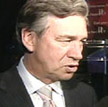 Who runs Canada today? The federal government in Ottawa or the provincial premiers? More exactly, how can the provinces, who do largely run Canada’s regional welfare or “service states,” tap a greater share of Ottawa’s vigorous revenue stream? And what does this have to do with the constitutionally mandated federal “equalization payments” to less affluent provinces?
Who runs Canada today? The federal government in Ottawa or the provincial premiers? More exactly, how can the provinces, who do largely run Canada’s regional welfare or “service states,” tap a greater share of Ottawa’s vigorous revenue stream? And what does this have to do with the constitutionally mandated federal “equalization payments” to less affluent provinces?
If you haven’t already gone to sleep on this, the 10 provincial premiers (and the three territorial leaders – but it’s best to forget them in a short account) have been arguing about much-needed reforms in the arcane formula for calculating equalization payments for months now, at various forums in various parts of the country. They will next be gathering this coming July 2628 in St. John’s, Newfoundland, for their annual mid-summer premiers’ (and territorial leaders’) meeting – which has recently been more grandiloquently renamed the “Council of the Federation.”
If the premiers ever could agree on how to reform equalization payments, then Ottawa would probably have to accept what they had agreed on. (And then it would be the premiers and not the federal government who are running Canada, etc.) But of course they cannot agree, each for sound reasons of their own. It seems unlikely that this will change at the premiers’ annual summer barbecue for 2006 (a.k.a. the Council of the Federation).
In fact, the federal government makes equalization payments from its own revenues in any case. So, somewhat ironically, Prime Minister Stephen Harper – who in theory wants to give even more weight to the provinces in the confederation than they have already – will probably decide how to reform equalization payments in the fall, all by himself in Ottawa.
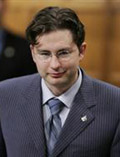 For added zest, Mr. Harper’s key national public policy objective at the moment is to win a majority Conservative government in the next federal election (which could come, say, any time after the current Liberal leadership convention early this December – see below). He appears convinced that building on the almost astonishing support his party won in Quebec in this past January’s federal election is one very big key to meeting his key current objective.
For added zest, Mr. Harper’s key national public policy objective at the moment is to win a majority Conservative government in the next federal election (which could come, say, any time after the current Liberal leadership convention early this December – see below). He appears convinced that building on the almost astonishing support his party won in Quebec in this past January’s federal election is one very big key to meeting his key current objective.
Thus a recent item in the Ottawa Citizen has summarized what many seasoned cynical observers see as the ultimate outcome of this current great debate: “Soccer is sometimes defined as a sport in which 22 men chase after a ball for 90 minutes and in the end Germany wins. Similarly, equalization could be defined as recurring negotiations in which 11 Canadian governments sit around a table and in the end Quebec wins.” (It is, many seasoned cynical observers will also point out, an old story in Canadian politics – which is no doubt one of the reasons Quebec is still a part of Canada.)
3. Official apology for Chinese head tax, 1885-1923?
 On Thursday, June 22 Prime Minister Harper “will offer a formal apology … to Chinese Canadians for the head tax” that some 81,000 of their ancestors had to pay to immigrate to Canada between 1885 and 1923. (And then in 1923, by the way, Ottawa barred Chinese immigrants from Canada altogether until1947.)
On Thursday, June 22 Prime Minister Harper “will offer a formal apology … to Chinese Canadians for the head tax” that some 81,000 of their ancestors had to pay to immigrate to Canada between 1885 and 1923. (And then in 1923, by the way, Ottawa barred Chinese immigrants from Canada altogether until1947.)
This has been an issue that has exercised some Chinese Canadians for years. Former Liberal prime minister Pierre Trudeau refused to make any such apology, on the grounds that once the present starts apologizing to the past in this way there is just no end to what might be included.
Nowadays, however, the Chinese have replaced the Italians, e.g., as the single largest non-anglo cultural community in the Toronto area. And Chinese Canadian (or Canadian Chinese?) voters are at least equally prominent in the Vancouver area, which is that much closer to China itself.
More importantly still, perhaps, for years as well many different groups of non-anglo Canadians have felt that Stephen Harper’s kind of Canadian conservatism has no real room for them. Prime Minister Harper is trying to show whoever may be interested that this is just not so. He really does want to win a majority of seats in parliament in the next election. (And given Canada’s present electoral and political party system, he can do it with about 40% of the popular vote.)
4. New “autonomy” in Quebec?
 It seems increasingly possible that the Harper Conservatives’ sort-of victory in this past January’s federal election (currently a 125-seat minority government in a 308-seat parliament, with just over 36% of the popular vote) has begun to have an almost entirely unanticipated impact on the over-arching political mood in Quebec.
It seems increasingly possible that the Harper Conservatives’ sort-of victory in this past January’s federal election (currently a 125-seat minority government in a 308-seat parliament, with just over 36% of the popular vote) has begun to have an almost entirely unanticipated impact on the over-arching political mood in Quebec.
The potential good news is that Mr. Harper’s theories about the virtues of still further decentralizing the already highly decentralized Canadian confederation of 1867 have apparently sparked an as yet still quite vague but potentially intriguing new phase in the long and complex saga of modern Quebec’s political development.
Ever since the present confederation began in 1867, you could say, Quebec has always been a province “not like the others.” A place where the majority of people customarily speak French is bound to be not like places where the majority of people customarily speak English. Ever since 1867 as well, there has been almost continuous debate in Quebec about how best to express this difference in the world of practical politics.
 Since the 1960s, the preferred option among those who really take the question seriously has been “sovereignty.” Now, in the summer of 2006, you can hear fresh talk about something called “autonomy” instead of “sovereignty.” This is apparently more friendly to the idea of Quebec as a permanent part of Canada, whatever else, and arguably has to be a good thing.
Since the 1960s, the preferred option among those who really take the question seriously has been “sovereignty.” Now, in the summer of 2006, you can hear fresh talk about something called “autonomy” instead of “sovereignty.” This is apparently more friendly to the idea of Quebec as a permanent part of Canada, whatever else, and arguably has to be a good thing.
At the same time, keen students of the Canadian past will note that something quite a lot like this also tried to happen the last time Canada was more or less run by a Conservative government in Ottawa – in the mid to late 1980s and early 1990s. Remember Quebec’s quest for constitutional recognition as a “distinct society” in the ultimately failed Meech Lake Accord?
Whether Mr. Harper and his new Alberta Conservative brain trust at all seriously imagined that they would be revisiting the Meech Lake Accord once they actually got into office is doubtful enough. And whether they accept it even now that it has started to happen seems far from clear as well. But who knows? Maybe this time it will somehow actually work?
5. Bizarre Liberal leadership race?
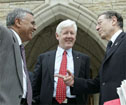 The ultimate electoral condition of the opposition Liberals will have a great deal to do with whether the Harper Conservatives can win a majority government in the next federal election. The latest reports from the front lines of the current 11-candidate Liberal leadership race, which will culminate in Montreal early this December, still sound … well, a bit flaky.
The ultimate electoral condition of the opposition Liberals will have a great deal to do with whether the Harper Conservatives can win a majority government in the next federal election. The latest reports from the front lines of the current 11-candidate Liberal leadership race, which will culminate in Montreal early this December, still sound … well, a bit flaky.
By most accounts, Michael Ignatieff remains the front runner. Just from his appearances on TV, he is an able, intellectually heavy, and generally impressive candidate, with true gravitas. But he still has two great flaws. He has spent most of his adult life outside Canada (mostly in the US and the UK). And he has supported the US and UK in their Iraq adventure (as well as the Harper government’s two-year extension of the Canadian commitment in Afghanistan).
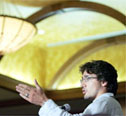 Who else is there, among the 10 other candidates? Some say Gerrard Kennedy, the former Ontario provincial education minister, who was born and raised in rural Manitoba, and ran Canada’s first food bank in Edmonton, Alberta for a few years.
Who else is there, among the 10 other candidates? Some say Gerrard Kennedy, the former Ontario provincial education minister, who was born and raised in rural Manitoba, and ran Canada’s first food bank in Edmonton, Alberta for a few years.
In some recent comments on Kennedy John Ibbitson of the Globe and Mail asked “has there ever been a politician who can say absolutely nothing with so much passion?” But who knows? Maybe that is the kind of ambiguous liberal politician the majority of Canadians who still don’t like Stephen Harper are looking for – at least hard enough to defeat Mr. Harper’s quest for a Conservative majority government?
6. Old aboriginal rights in Ontario?
 Some will still remember the protests by what the Constitution Act 1982 calls “the aboriginal peoples of Canada,” that suddenly sprung up at Oka near Montreal in the long hot summer of 1990, immediately after the failure of the Meech Lake Accord.
Some will still remember the protests by what the Constitution Act 1982 calls “the aboriginal peoples of Canada,” that suddenly sprung up at Oka near Montreal in the long hot summer of 1990, immediately after the failure of the Meech Lake Accord.
All this helped lead to the inclusion of aboriginal constitutional issues in the also ultimately failed Charlottetown Accord of 1992, which tried to make the Meech Lake Accord more acceptable to the provincial governments and people of Canada.
Now in the summer of 2006 the Six Nations Iroquois land-claim protest in Caledonia, Ontario, not too far from Toronto, stands as another potentially intriguing historical parallel with the later days of Brian Mulroney’s last age of Conservative federal government in Canada.
Mr. Harper appears to see the Six Nations protest as a textbook example of just why it should be Dalton McGuinty’s Liberal provincial government in Ontario, and not the Conservative government in Ottawa, that has to deal with the thorniest issues in Canada today.
As we write, and as the approaching summer heat has raised tempers at Caledonia, Premier McGuinty himself has become freshly impatient with a few recent unsettling actions among the aboriginal protesters, who have been on the job since late this past February. This may have helped spawn some break in whatever the ultimate logjam is.
Mr. McGuinty’s emissary in the matter, former Ontario Liberal premier David Peterson, is said to be bringing some form of encouraging news to TV Ontario on the evening of June 15. Whatever this is will probably continue to bear close watching, as the lazy, hazy days drift by. (Meanwhile the local TV reports that some non-aboriginal residents of Caledonia are launching lawsuits, to seek compensation for business losses induced by the long protest.)
7. Bizarre provincial election in Nova Scotia?
 The June 13 Nova Scotia provincial election almost seemed to offer a droll commentary on the current fractured state of Canadian politics writ large – even without the Bloc Quebecois.
The June 13 Nova Scotia provincial election almost seemed to offer a droll commentary on the current fractured state of Canadian politics writ large – even without the Bloc Quebecois.
The provincial Conservatives under the 34-year-old former musician Rodney MacDonald, a rather different kind of conservative than Stephen Harper (with a “platform borrowed heavily from previous NDP policies”) won “23 seats in the 52-seat legislature down from the 25 they held when the election was called. The New Democrats went from 15 to 20 seats, and the Liberals fell from 10 to nine seats.”
As the Canadian Press has reported: “Even though the two opposition parties have more seats than the Tories, MacDonald will retain governing status because his party was not defeated. But that will only last if MacDonald succeeds in winning support from one of the other parties.”
If Mr. MacDonald can’t win this kind of support, the stage could in theory be set for some kind of New Democrat-Liberal alliance – as in Ontario 1985-1987, but with the New Democrats and not the Liberals in the driver’s seat. This exact kind of “united left” prospect still seems quite unlikely in federal politics, for the moment. But it is dramatic when you think that less than a generation ago Atlantic Canada was the last bastion of the old two-party system. And it must be giving the federal Liberals some further cause for deep thought.
8. Senate reform in the West?
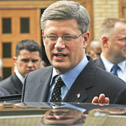 Some may remember that major reform of the appointed Canadian Senate in Ottawa – which has been aptly called “a relic of the 19th century” by Prime Minister Harper – also figured in the ultimately failed Charlottetown Accord of 1992.
Some may remember that major reform of the appointed Canadian Senate in Ottawa – which has been aptly called “a relic of the 19th century” by Prime Minister Harper – also figured in the ultimately failed Charlottetown Accord of 1992.
Since the 1980s at least, Senate reform has been widely understood as a constitutional aspiration of Western Canada – designed to secure greater regional representation for Western interests in the federal corridors of power.
Alberta has been the heartland of the modern Canadian so-called “Triple E” Senate reform movement – elected, effective, and with equal representation for each province. It has become clearer than it used to be that exactly equal provincial representation won’t work for Quebec, just to start with. But with some fudging on this point, Stephen Harper from Alberta ran in this past January’s federal election on a platform that included at least “step-by-step” Senate reform, starting with starting to make the present appointed body elected.
Everything is more complicated once you get into office. As it happens, a new Harper Conservative minority government bill now before parliament proposes beginning the step-by-step reform even more modestly, with a reduction in Senators’ current up-to-75-years-old term of office to a mere eight years. Mr. Harper is still saying he hopes to make progress on actually electing Senators a bit further down the road, but at least some kind of reform has begun.
 Meanwhile, only one of the current four Western Canadian provincial premiers – Ralph Klein of Alberta – seriously supports any kind of Senate reform. The other three apparently agree with the premier of Ontario that the institution should probably just be abolished. So who really wants Senate reform in Canada anyway?
Meanwhile, only one of the current four Western Canadian provincial premiers – Ralph Klein of Alberta – seriously supports any kind of Senate reform. The other three apparently agree with the premier of Ontario that the institution should probably just be abolished. So who really wants Senate reform in Canada anyway?
The negative views of even Western Canadian premiers, on the other hand, are not all that surprising. A reformed Senate that did strengthen regional representation in Ottawa would reduce the voices of provincial premiers in the wider life of Canada, coast to coast to coast.
And if Mr. Harper ever does succeed in pushing things at all seriously in this direction, he will once again have stood up for a considerably stronger Canadian federal government than his allegedly passionate theories about the virtues of a still more decentralized federation imply.
Mmmm … The TV news on the evening of June 14Â also reported that Mr. Harper’s finance minister Jim Flaherty (from Ontario) has been calling for one Canada-wide securities regulator (as opposed to the present several provincial regulators), to bolster the country’s prestige among financial and other markets abroad. That sounds like a stronger Canadian federal government too – as well as a quite sensible idea, regardless of where you come from.

